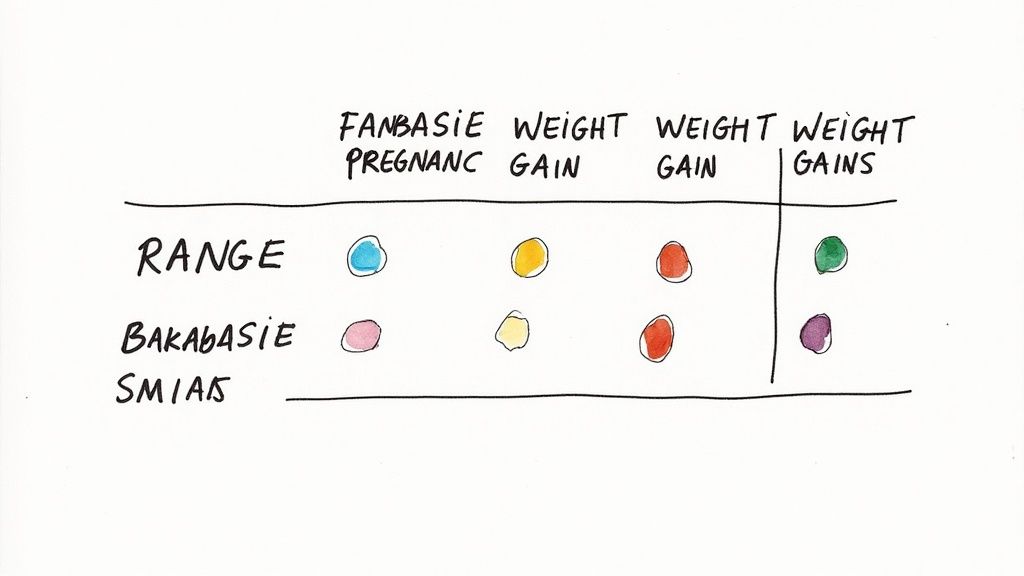Why Traditional Pregnancy Weight Tracking Needs an Update

Most pregnant women are familiar with the standard weight gain charts at their doctor’s office. But these basic guidelines often fall short – research shows that only about 32% of women actually stay within the recommended ranges during pregnancy. This raises important questions about whether our current approach truly supports healthy pregnancies.
The Problem with One-Size-Fits-All
The standard pregnancy weight guidelines rely heavily on pre-pregnancy BMI, sorting women into simple categories like “underweight” or “normal weight.” But this basic sorting misses so many important factors. A woman’s individual metabolism, medical history, and even cultural background can all affect healthy weight gain patterns during pregnancy. For instance, someone with past gestational diabetes may need different targets than another mom-to-be with similar stats but no health concerns. These real-world differences show why basic charts often fall short.
Embracing Personalized Tracking with a Pregnancy Weight Gain Calculator
This is where better tools can help. A pregnancy weight gain calculator, like the one from Pregnancy 101, looks at the full picture – not just BMI. It factors in your starting weight, height, and how far along you are to give recommendations that make sense for you. The week-by-week tracking helps you spot trends early, so you can make small adjustments to your eating and exercise with your doctor’s guidance. This personal approach leads to better outcomes for both mom and baby.
Moving Beyond the Numbers: A Holistic Approach
While tracking your weight matters, it’s just one part of a healthy pregnancy journey. Good nutrition, staying active, and taking care of your emotional health are equally important pieces of the puzzle. A pregnancy weight calculator gives you helpful data about your progress, but it works best when paired with advice from your healthcare team. Working with your doctor or dietitian to interpret the numbers, while focusing on overall wellness, gives you the best foundation for a healthy pregnancy.
Mastering Your Pregnancy Weight Gain Calculator
A pregnancy weight gain calculator is a helpful tool that tracks and guides healthy weight gain during pregnancy. Learning how to use one, like the calculator from Pregnancy 101, can help you stay on track for a healthy pregnancy.
Understanding the Algorithm
These calculators use medical guidelines from trusted organizations like the National Academy of Medicine to create personalized recommendations. They look at key details about you – your height, pre-pregnancy weight, current weight, and how many weeks pregnant you are. This creates weight gain targets specific to your needs, rather than using general guidelines. For example, if you started pregnancy at a higher weight, your recommended weight gain range will likely be different than someone who started at a lower weight.
Interpreting Weekly Fluctuations
Weight gain during pregnancy rarely follows a perfectly steady pattern. Some weeks you might gain more, while other weeks you might gain less or stay the same. The calculator helps make sense of these normal changes by tracking your weight week by week and showing if you’re staying within a healthy range overall. The visual charts make it easy to spot any concerning patterns – like gaining weight too quickly or not gaining enough – so you can discuss them with your doctor.
Making Informed Adjustments
Having clear data about your weight gain helps you make smart choices about your health. If you notice you’re gaining faster than recommended, you can talk with your doctor or dietitian about adjusting your eating and exercise habits. This might mean choosing more nutritious foods, watching portion sizes, or finding pregnancy-safe workouts. On the flip side, if you’re gaining slower than expected, the numbers can help start an important conversation with your doctor about making sure you and your baby are getting proper nutrition.
Avoiding Common Tracking Mistakes
To get reliable results from your calculator, stick to a consistent weighing routine. Try to weigh yourself at the same time each week, wearing similar clothes and using the same scale. It’s best to weigh yourself first thing in the morning after using the bathroom, before eating or drinking. Avoid weighing right after meals or when you’re retaining water, since these can temporarily affect the numbers. Remember that the overall pattern matters more than day-to-day changes. Using the calculator correctly gives you valuable information to help keep your pregnancy on a healthy track.
Your Trimester-by-Trimester Weight Journey

Tracking your weight changes during pregnancy helps ensure both you and your baby stay healthy. Each trimester brings different needs and expectations. To help you stay on track, tools like the Pregnancy 101 weight gain calculator can give you personalized guidelines based on your specific situation.
First Trimester: Subtle Shifts and Foundational Nutrition
Most women don’t gain much weight in the first 12 weeks, but this time is crucial for developing good eating habits. Your focus should be on getting the right nutrients rather than eating more. Getting enough folic acid, for example, helps prevent birth defects as your baby’s neural tube develops. The healthy habits you start now will support proper weight gain later in your pregnancy.
Second Trimester: Steady Growth and Increased Caloric Needs
Weeks 13-26 bring more noticeable changes as your baby grows quickly. Your body needs about 340 extra calories each day during this time, according to the National Academy of Medicine (if you started pregnancy at a normal weight). This helps support your baby’s developing organs and tissues. Using a weight gain calculator can help you track whether your weekly gains are on target. Remember that it’s normal for your weight to go up and down slightly from week to week.
Third Trimester: Preparing for Birth and Continued Growth
In the final months, your body keeps changing to support your growing baby. You’ll need about 450 extra calories daily compared to before pregnancy, based on National Academy of Medicine guidelines for women who started at a normal weight. Your baby gains weight rapidly now, and your body stores extra fat to prepare for breastfeeding. Weekly weigh-ins and calculator checks help you stay within healthy ranges during these important final weeks.
Recognizing Variations and Seeking Guidance
Every pregnancy is different, and what’s normal for one woman may not be for another. While weight tracking tools give helpful guidelines, your doctor knows your specific situation best. Regular check-ups let them monitor whether your weight changes are healthy for you and your baby. They can spot potential issues early and adjust recommendations based on how your pregnancy progresses. Using both tracking tools and your doctor’s guidance gives you the best support for a healthy pregnancy.
Smart Nutrition for Healthy Weight Progress
When it comes to pregnancy weight gain, knowing what to expect each trimester is just the first step. While tracking your progress with tools like the Pregnancy 101 weight calculator is helpful, the real key lies in making smart food choices. Instead of focusing only on numbers on the scale, consider the quality of what you eat. Good nutrition during pregnancy means feeding both yourself and your growing baby with the right mix of nutrients.
Building a Balanced Plate for Two
Creating healthy meals during pregnancy is like painting with food. Your plate should include foods from each major group:
- Lean Protein: Choose chicken, fish, beans, lentils, and tofu to help build your baby’s growing body
- Whole Grains: Pick brown rice, quinoa, whole wheat bread, and oats for steady energy throughout your day
- Fruits and Vegetables: Fill your plate with different colored produce to get a wide range of vitamins
- Low-Fat Dairy: Include milk, yogurt, and cheese to support your baby’s developing bones
For a quick meal idea, try making a simple grilled chicken salad with fresh greens, cooked quinoa, and your favorite vegetables, dressed with a light vinaigrette.
Working Through Common Food Challenges
Pregnancy often brings changes in how you feel about food. You might suddenly dislike foods you used to love or crave unusual combinations. Many women also deal with morning sickness or heartburn. Here’s how to handle these common issues:
- Small, Frequent Meals: Break up your eating into smaller portions throughout the day to help with nausea and keep your energy steady
- Stay Hydrated: Drinking enough water helps ease nausea and other discomforts
- Trust Your Body: When you have specific food cravings, talk to your doctor about finding healthy ways to satisfy them
Remember that even with these challenges, you can still make choices that give you and your baby important nutrients.
Making Meal Planning Work
Taking time to plan your meals makes it easier to eat well, especially during busy weeks. Try these practical tips:
- Prep Ahead: Cut up vegetables, cook grains, and pack snacks in advance for quick, healthy eating
- Double Your Recipes: Make extra food to freeze for days when you don’t feel like cooking
- Track Your Progress: Use pregnancy weight calculators along with your meal planning to make sure you’re on track with healthy weight gain
These simple steps can help you meet your nutritional needs while managing healthy pregnancy weight gain. Good nutrition is one of the best ways to take care of yourself and your growing baby.
Staying Active Safely During Pregnancy

Staying active is a crucial part of a healthy pregnancy. It’s more than just managing weight gain, though tools like a pregnancy weight gain calculator can be helpful. Exercise prepares your body for labor, delivery, and the postpartum period. Regular physical activity contributes significantly to both your physical and mental well-being throughout your pregnancy.
Choosing the Right Activities
Finding activities you enjoy that are also safe for pregnancy is essential. Excellent choices include walking, swimming, and prenatal yoga. For instance, walking is a low-impact way to get your heart rate up, while swimming supports your body weight, minimizing stress on your joints. Prenatal yoga, on the other hand, helps you improve flexibility, strength, and balance – all important for labor and delivery. A pregnancy weight gain calculator, such as the one from Pregnancy 101, can help you understand the role of activity in maintaining a healthy weight during pregnancy. This information can empower you to make informed decisions about your exercise routine.
Modifying Your Routine as Needed
As your pregnancy progresses, adjustments to your exercise routine will be necessary. During the second and third trimesters, it’s important to avoid high-impact activities or anything that could increase your risk of falling. This means activities like running, contact sports, and some types of strength training might need to be put on hold. However, modifications can allow you to continue some of these activities in a safer way. For example, if you’re a runner, consider switching to brisk walking or using an elliptical machine. The key is to listen to your body and adapt your workouts as needed.
Listening to Your Body’s Signals
Paying attention to your body’s cues is paramount. If you experience any pain or discomfort during exercise, stop immediately and talk to your doctor or midwife. Some symptoms, like shortness of breath, dizziness, or vaginal bleeding, require immediate medical attention. Staying hydrated is also especially important when you’re exercising. Drinking plenty of water before, during, and after your workout helps prevent dehydration and supports your overall health. Remember, prioritizing your health and your baby’s well-being is essential throughout your pregnancy. Using a pregnancy weight gain calculator and maintaining a mindful approach to exercise can help you manage your weight and prepare for labor and delivery. By combining these strategies, you can have a healthier and more comfortable pregnancy experience.
Overcoming Weight Gain Challenges

Pregnancy brings many physical changes, including shifts in your weight. While tracking tools like pregnancy weight gain calculators can help guide you, it’s completely normal to face some bumps along the way. Understanding these common challenges and having practical solutions can help you maintain a healthy pregnancy weight.
Common Pregnancy Weight Gain Hurdles
Your body goes through numerous changes during pregnancy that can affect your weight. Here are some of the most common challenges you might face:
- Morning Sickness: The nausea and vomiting that often comes with the first trimester can make eating difficult and sometimes lead to weight loss
- Food Aversions and Cravings: Pregnancy hormones might make you suddenly dislike foods you used to enjoy or develop strong cravings for specific foods
- Gestational Diabetes: This type of diabetes that develops during pregnancy requires careful monitoring of blood sugar and may change your recommended weight gain
- Pre-existing Health Conditions: Medical conditions like thyroid problems or PCOS can affect how your body gains weight during pregnancy
Remember that experiencing these challenges is a normal part of pregnancy – you’re not alone in dealing with them.
Strategies for Managing Challenges
Finding practical ways to handle weight gain challenges often means trying different approaches. For morning sickness, eating small meals throughout the day and sticking to bland foods often helps. Drinking water regularly, even when you don’t feel thirsty, can both ease nausea and keep you healthy.
When cravings hit, try finding nutritious alternatives that satisfy your taste buds while supporting your health goals. If you have gestational diabetes or other health conditions, your doctor or dietitian can create an eating plan that works for you. The weight gain calculator at Pregnancy 101 can help you track your progress while following your healthcare team’s advice.
Getting Help Along the Way
Remember that pregnancy is meant to be a shared journey. Your support network – whether it’s your partner, family members, friends, or online communities – can provide both emotional support and practical help. Something as simple as having someone else handle grocery shopping or cook meals can make a big difference when you’re feeling overwhelmed.
Don’t hesitate to reach out to medical professionals if you’re worried about your weight gain or feeling stressed. Your doctor or a mental health specialist can provide the guidance and reassurance you need. Taking care of your mental well-being is just as important as monitoring your physical health during pregnancy.
Looking for more support with your pregnancy weight journey? Visit Pregnancy 101 for helpful resources, expert advice, and tools to support you throughout your pregnancy.

